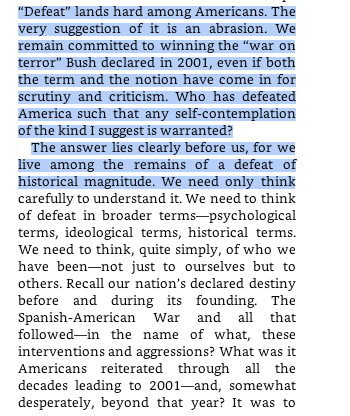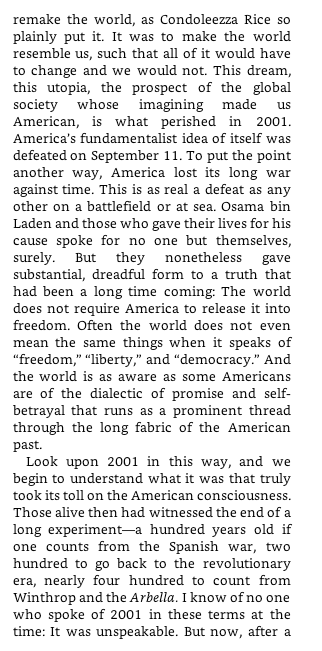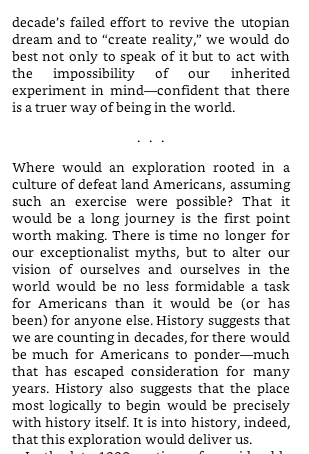Ricochet is the best place on the internet to discuss the issues of the day, either through commenting on posts or writing your own for our active and dynamic community in a fully moderated environment. In addition, the Ricochet Audio Network offers over 50 original podcasts with new episodes released every day.
 Trump and Expatriatism
Trump and Expatriatism
 I wasn’t going to write about Trump anymore. (In fact, I suspect some of you explicitly paid me not to write a book about Europe, but to shut up about Trump.) But I want to sort out my thoughts about his foreign policy speech. A bit.
I wasn’t going to write about Trump anymore. (In fact, I suspect some of you explicitly paid me not to write a book about Europe, but to shut up about Trump.) But I want to sort out my thoughts about his foreign policy speech. A bit.
I didn’t realize America was a country that could propel a character like Trump to frontrunner status. The surprise of this has made me more open-minded than I’d usually be. It’s led me to reading things I wouldn’t usually spend money to read. (Before buying a book on Amazon, I always look with guilt at the hundreds of unread books on my shelf, asking myself reproachfully why I need a new book when I’ve never once opened J.F. Bernard’s biography of Talleyrand.)
Yesterday on an impulse I bought a book by Patrick Smith, who also writes under the name Patrick Lawrence: Time No Longer: Americans After the American Century. I bought it, probably, because he’s a long-term expatriate and foreign correspondent, and because the way he described the book on his website made some kind of sense to me:
I had long suspected that my true subject was my own country, and by the time I started on this book, my most recent, it was a certainty. One learns about oneself, ultimately, by going to and fro among others.
That made me wonder if that was true of me, too — whether in writing about Europe, or any other part of the world, my true subject was really my own country, and by extension, myself.
Most expatriates wind up suspecting they’ve come to know something about America that other Americans don’t know. When you rub up against other cultures for a long time, it’s inevitable that you realize many aspects of yourself are owed to an accident of birth. But Trump’s campaign has so surprised me that I’m beginning to wonder if I know what I thought I did about America — which means I’m wondering whether I know myself.
I’d never heard of Patrick Lawrence before, but he wrote a column about Trump’s foreign policy speech, and like a moth to a flame, I clicked on it:
I think we need to think again. I urge everyone to watch Trump as he delivered his big foreign policy banana Tuesday at the Mayflower Hotel in Washington. I am not a Trump man by any stretch, and I will not pretend to assign percentages to what Trump got right and what wrong. Only this for now: What he gets wrong he gets very wrong, while what he gets right he gets stunningly, pithily right. It is not a combination destined to prove at all workable. But in a single morning he has made himself worth listening to, from whatever distance one may choose.
Leave aside the speech’s internal contradictions and the question of whether Trump means any of it. I too found the speech surprising. I would not have expected the putative 2016 GOP frontrunner so passionately to assert that all of American foreign policy since the end of the Cold War has been an epic, arrogant mistake. That means there’s something about America I really didn’t understand.
Lawrence agrees with Trump. He takes this position further back in time: He sees all of American foreign policy since the Spanish-American war — more or less — as an epic, arrogant mistake, and sees the way we fought the Cold War, in particular, as ruinous. As he puts it on his website,
Our “American century” is over—an excellent thing, as I see it—and we must dispose of the myths that have led us astray so often. We can do this by dropping “destiny” and taking up “purpose”—a distinction Herbert Croly taught me to draw. Decline awaits us only if we choose it. In this book I began to encourage readers: Discover the optimism within the apparent pessimism, and do not confuse the two.
Croly was a turn-of-the century leader of the progressive movement. Once I would have thought of someone who tried to sell me a book about the disaster of our Cold War policies by appeal to Croly as a doctrinal leftist, full stop. But as I said, the Trump campaign has made me more open-minded about these categories and what they really mean — even about whether they exist — than I’d usually be. Here’s Lawrence on Trump’s speech:
“Our rivals no longer respect us,” Trump said at one point. “In fact they’re just as confused as our allies, but an even bigger problem is they don’t take us seriously anymore. The truth is they don’t respect us.”
No, Donald. Our rivals think we are reckless but respect us the way one respects what is fearful. The word you are looking for is “admiration,” and you can forget about that across the board. And our allies are not confused: They know the score perfectly well. It is only we Americans who find our conduct abroad confusing.”And later: “America is going to be strong again. American is going to be reliable again. It’s going to be a great and reliable ally again. It’s going to be a friend again. We’re going to finally have a coherent foreign policy….”
No, Donald. Drop the nostalgia because there is no going back. You have to distinguish between a strong nation and one that is merely powerful. We are the latter, not the former. And our foreign policy is perfectly coherent: It is only that its purposes cannot be articulated to a democratically minded people whose ignorance of our conduct abroad is essential to sustaining it.
Last night I spent a few hours reading Lawrence’s columns, then finally bought his book. I just finished it. I haven’t made up my mind about whether he’s saying anything coherent. But there’s something in his tone that I recognize. It’s the shock I, and probably many Americans before me, have felt when I realized that (contra Trump) America ruthlessly pursues the American interest. Or what policymakers see at that time, perhaps myopically, as the American interest. It’s the suspicion that our foreign policy is not always benevolent, or even sane. It’s the dawning conviction that if other Americans knew what we were doing overseas, or not doing, they’d be horrified. It’s the growing sense that surely it can’t be in our long-term interest for there to be such a huge disparity between what we tell ourselves about our foreign policy and the reality of it.
I had assigned the blame for moments like this (and there have been many of them) to Obama. Trump seems to assign the blame to our entire post-Cold War approach to foreign policy, which he suggests has been predicated on an outdated conception of America’s role in the world:
Unfortunately, after the Cold War our foreign policy veered badly off course. We failed to develop a new vision for a new time. In fact, as time went on, our foreign policy began to make less and less sense. Logic was replaced with foolishness and arrogance, which led to one foreign policy disaster after another.
Lawrence agrees. He just (explicitly) takes it further: Our policy has been off course for more than a century. It was always illogical, foolish, and arrogant. This is of course the belief that many conservatives have ascribed to Obama — a belief that America is not exceptional, nor has it been on balance a force for good.
Trump’s speech made him seem to me Obama’s natural successor, and made me decide that neither are the aberrations I thought they were. Both reflect an external reality: the relative loss of American power. Both envision a limited role for America in the world. Trump’s wrapping Obama’s view of the world in the American flag, and making it palatable to people who weren’t willing to hear it from Obama, but it’s the same message. We’re no longer able to be a benevolent global hegemon. Indeed, we never were a benevolent hegemon. The world will be fine, and so will we, without our efforts to lead it. If we’re an exceptional country at all, our destiny is to lead by example, not force. “America First” is not an accidental slogan. Trump certainly knows where it comes from, and I suspect most Americans at least intuit it.
Trump in many ways echoes the themes of Obama’s first presidential campaign:
We tore up what institutions they had and then were surprised at what we unleashed. Civil war, religious fanaticism, thousands of Americans and just killed be lives, lives, lives wasted. Horribly wasted. Many trillions of dollars were lost as a result. The vacuum was created that ISIS would fill. Iran, too, would rush in and fill that void much to their really unjust enrichment.
They have benefited so much, so sadly, for us. Our foreign policy is a complete and total disaster.
Here’s Obama in 2008:
… we have lost thousands of American lives, spent nearly a trillion dollars, alienated allies and neglected emerging threats – all in the cause of fighting a war for well over five years in a country that had absolutely nothing to do with the 9/11 attacks.
And with just a few changes in tone,
I am running for President because it’s time to turn the page on a failed ideology and a fundamentally flawed political strategy, so that we can be intelligent about keeping our country safe. I stood up and opposed the Iraq war from the start, and said that we needed to fight al Qaeda.
Hillary Clinton says she’s passed a “Commander in Chief test” – not because of the decisions she’s made, but because of all the years she’s spent in Washington. But here is the truth, folks, believe me: there is a gap in this country – a gap between people who claim to be tough on national security, and how unsafe we are because of their stupid, disastrous decisions. Our foreign policy is a complete and total disaster.
The war in Iraq enriched Iran, continuing its nuclear program and threatening our ally, Israel. Instead of the new Middle East we were promised, we got nothing. The war in Iraq has enriched North Korea, which built new nuclear weapons and even tested one.
The above passage is Obama in 2008, with a few words changed so that the voice sounds more like Trump’s, although the meaning is intact.
A world — including me — that’s been looking at Obama for eight years and wondering if the American century is over is now watching the Trump campaign and realizing that it’s long since past. Come 2016, Trump or Hillary Clinton will be in the White House. Clinton is explicitly running on “more of Obama’s foreign policy.” Trump is implicitly running on the same promise, and proposing to get there at warp speed.
Lawrence argues that this was baked into the cake already by September 11. The date, he writes, marked the end of the American Century, and we’ve wasted the first 15 years of the next one by refusing to confront this honestly.



As I said, Lawrence and I disagree fundamentally. He thinks, on balance, that the American century overwhelmingly did more harm than good to the world, and that constructing a myth of American exceptionalism and denying the reality of our policy and its effects fundamentally warped America.
I don’t think this, but I’m willing to give him a fair hearing, because I’m realizing he speaks for much more of America than I realized. Two Obama terms and a prospective Trump or Clinton term don’t add up to voters making a one-off mistake in the voting booth. Americans view America very differently from the way I do. And whether they’re right to view it this way or not, that they believe this will shape the future. So perhaps Lawrence is right. In which case, where would an exploration of a “culture of defeat” lead us?
“If Americans do not accept the advance of history,” he writes, “relative decline will devolve into absolute decline.” Only if we admit defeat, he argues, can we escape this, the final defeat.
He doesn’t ask what would happen to the rest of the world, and to us, if we embraced defeat. This is an easy question for him, because he thinks the American Century was on balance bad for the world. I don’t.
But I think far more Americans do than I’d realized.
What did you make of the speech?
And now back to that biography of Tallyrand …
Published in General



I don’t think it’s reasonable to expect all of my fellow citizens to struggle through this biography of Talleyrand with me. Or to be able to extemporize spontaneously on the Paris Peace Conference and the Versailles Treaty (although I do think it should be impossible to graduate from college without being roughly aware what that was and what it was significant).
But knowing what the Pax Americana is, or was, is very much key to knowing one of the most essential facts about America — one of the most important ways America that changed the world, probably the most important — and if you’re an American who doesn’t know that, you don’t know something very important about yourself. Because all of us were shaped by that. We all grew up with the habits of mind and assumptions of an unprecedented global imperial power, even if younger people among us could feel it slipping away.
When Trump talks about making America great again, he’s implicitly suggesting there was a time of American greatness in the past. What was that greatness? What were those achievements? I don’t think people are thinking about this in strictly material terms — better jobs, income mobility. I suspect that even if they don’t know the term “Pax Americana” or what it stands for, they’ve inherited a vague appreciation that once, America did something unprecedented in the history of mankind, and it was powerful, respected, and admired around the world because of it.
To not know what that was, if you’re an American, is to be deprived of your own history — a part of your birthright and a part of yourself.
I think all of that’s true, but I think Indians know more about Indian history, Europeans about European history, etc. Since America was for a century a global power, and for much of it the global power, it seems strange that this wouldn’t be something Americans know about. (The British certainly know that they used to have an empire upon which the sun never set, for example. And roughly where it was and how it ended.)
Basically, Claire, as others have intimated, American formal education has become more about propaganda and campaign-friendly legislation than about actual learning.
I was saved by family. Others were saved by books. Maybe some will be saved by Ricochet… or your upcoming book.
And Americans know they originated as 13 Colonies, filled a continent, and won World War II. Sometimes they even know the Russians helped. And they have some vague idea that awesomeness happened afterwards and that American was great, and probably had something to do with it.
They don’t know the phrase “Pax Americana,” and they couldn’t explain the Breton Woods System, nor do they understand exactly what the Navy does or why we have soldiers in Europe given that we’re no longer fighting the Russians -though if they thought about it they might figure out that all the soldiers in Iraq stage from Germany.
How many Englishmen could give a discourse on the Royal Navy, though?
Which is not to say that I disagree with Aaron. My students are, as I have said before, frequently gullible and ignorant -for which I blame their high school teachers. But if the American People don’t understand the details of policy, I don’t blame them for that. They have no reason to know. Nor do I blame them for being suspicious of a foreign policy establishment most characterized by always having a reason it isn’t their fault.
No, we shouldn’t have.
Claire,
As interesting as Talleyrand is (I prefer Mr. Pitt..well I am from Pittsburgh) I think the video below is more important to this discussion.
Jeb! Bush and his brilliant team actually believed they could run for the Presidency as the third Bush and not defend W’s record. They actually believed that the Iraq War wasn’t going to come up. Trump, like the crude idiot that he is, charged in to destroy Jeb! He did. I think that was the moment you knew Jeb! was hopeless. If you noticed that disloyal “guy in a hurry” Marco Rubio leaped to W’s defense from a Trump argument that was to the left of Barack Obama. That was the moment that put us here.
All that was required from Jeb! & Murphistopheles was to figure out to say that the Iraq War was necessary but that they should have gone to the surge much sooner. This would put the onus back on Obama for blowing the surge success.
Claire, your Patrick Lawrence is just one more classical lefty pitching a crypto-Marxist Leninist narrative about the decline and fall of capitalist democracy. Everything that America has done since 1900 has been just terrible. The world would have worked out so much better without us. This is so stupid as to be beneath all contempt. America stayed out of both WWI and WWII as long as possible. After WWII, the US slowing down Chinese Communism and thwarting Stalins designs on Europe are master strokes of grand strategy. It really is simple. America isn’t an Imperialistic-Colonial Power. This just can’t be the truth because crypto-Marxist Leninists would be forced to go out and get themselves a fresh theory. They are the singularly laziest uncreative intellects on earth so that just isn’t something they are going to do.
One very large Bronx Cheer for Mr. Lawrence. There now. Didn’t that make you feel more familiarly American? Nothing like a good old Bronx Cheer to bring out the American in my Parisian Professor.
Regards,
Jim
I highly recommend people read “Trump v. the Council on Foreign Relations.” Rather has Claire’s name written all over it.
And, “A Litmus Test for ‘New People.‘”
Robert,
Good stuff.
Regards,
Jim